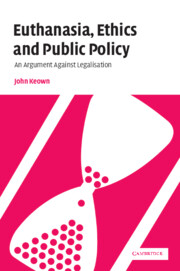Book contents
- Frontmatter
- Contents
- Preface
- Foreword
- Acknowledgments
- Table of cases
- List of abbreviations
- Introduction
- PART I Definitions
- PART II The ethical debate: human life, autonomy, legal hypocrisy, and the slippery slope
- PART III The Dutch experience: controlling VAE? condoning NVAE?
- PART IV Australia and the United States
- PART V Expert opinion
- PART VI Passive euthanasia: withholding/withdrawing treatment and tube-feeding with intent to kill
- Conclusions
- Afterword
- Bibliography
- Index
Introduction
Published online by Cambridge University Press: 20 July 2009
- Frontmatter
- Contents
- Preface
- Foreword
- Acknowledgments
- Table of cases
- List of abbreviations
- Introduction
- PART I Definitions
- PART II The ethical debate: human life, autonomy, legal hypocrisy, and the slippery slope
- PART III The Dutch experience: controlling VAE? condoning NVAE?
- PART IV Australia and the United States
- PART V Expert opinion
- PART VI Passive euthanasia: withholding/withdrawing treatment and tube-feeding with intent to kill
- Conclusions
- Afterword
- Bibliography
- Index
Summary
Despite the major advances in medicine and palliative care witnessed by the last century, many patients, even in affluent Western nations, still die in pain and distress. Some entreat their doctors to put an end to their suffering either by killing them or by helping them to kill themselves. In almost every country in the world, a doctor who complies with such a request commits the offence of murder or assisted suicide and faces a lengthy term of imprisonment and professional disgrace.
Yet many people think it should be lawful for a doctor to end a suffering patient's life on request, either by administering a lethal injection or by assisting the patient to commit suicide. Organisations campaigning for legal reform, such as the Hemlock Society in the USA or the Voluntary Euthanasia Society (VES) in the UK, are not proposing that a doctor should be allowed to kill patients whenever he feels like it. Mindful of the obvious and gross abuses which might follow were doctors given a completely free hand, such organisations typically propose that doctors should be allowed to end life only if the patient is competent to make a decision, has been informed about alternatives such as palliative care, and has voluntarily asked for life to be ended or to be given the means to commit suicide. Nor do such organisations typically propose that the law should allow doctors to kill patients whenever the patient feels like it.
- Type
- Chapter
- Information
- Euthanasia, Ethics and Public PolicyAn Argument Against Legalisation, pp. 1 - 6Publisher: Cambridge University PressPrint publication year: 2002



